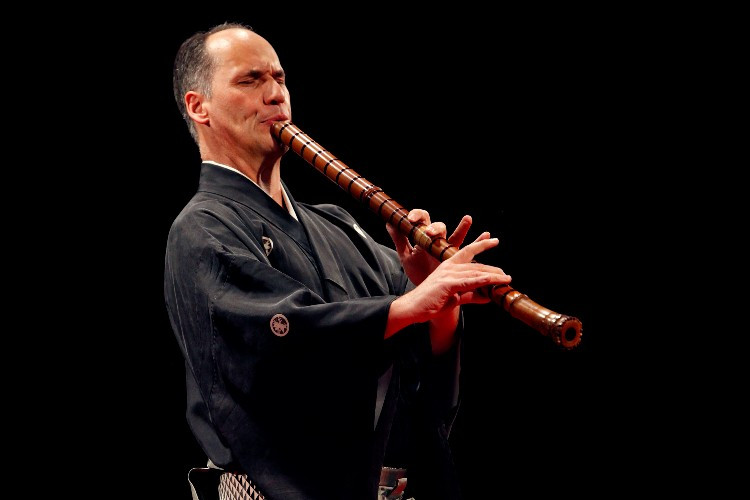Explore Japanese Music with Community Scholar Marco Lienhard

A’Lelia Bundles Community Scholar Marco Lienhard is a student and performer of Japanese music played on a variety of instruments, including the taiko drum and the shakuhachi flute. He founded the New York City performance group, Taikoza and has spent his three years as a Bundles Scholar exploring how Japanese music is performed outside of Japan for a book he's writing on the subject.
LEARN MORE
He spoke to Neighbors about his interest in and experience with studying and performing Japanese music.
How did you get into playing and performing Japanese music?
While on an exchange student program to Japan from Switzerland, I joined a group called Ondekoza, a legendary Japanese taiko drum group that brought the drum to the world and created a renaissance. I was planning to study with them for a few months, but that turned into 18 years.
With the help of the group, I was introduced to one of the best shakuhachi players of the time, Katsuya Yokoyama, and studied with him while performing. Ondekoza worked as a commune and we studied different Japanese instruments and art forms as part of the training. We toured internationally, including running marathons in New York, LA, and Boston and performing at the finish line right after finishing the race. We also ran the perimeter of the United States on old highways and roads, and performed along the way. The run happened from 1990-1993. In 1998, I left the group and moved to New York City.
What was your training to play these instruments like?
My training with Ondekoza consisted of 5-6 hours of taiko drumming and several runs during the day as part of the training. We would wake up at 5:30 AM and then go for a 5-mile run before practicing taiko drum for three hours in the morning and another three hours in the afternoon, which was followed by a long run of 15-25 miles. I also specialized in the bamboo flute, which has several types, including shakuhachi and nohkan. Once a month I would travel 700 miles to Tokyo for those instructions.
I would practice the flute during rest hours and managed to add another 3-4 hours of flute practice in my days. I was not allowed to practice flute inside and was encouraged to play outside to develop a bigger sound and so I would not get used to playing in a small room. Our concerts in large venues were usually done acoustically and not using microphones. It was quite a rigorous training that we were doing to be a member of the group Ondekoza.
The running was part of the taiko drumming training to build up stamina and get a leaner muscle mass compared to people who would just do muscle training. The other reason was to get everyone exhausted, keeping them from going out to party at night. The commune also had strict rules, such as no smoking, no drinking, and no TV. Since then, the regimen of the group has changed greatly and has adapted to our modern times. Group such as Kodo (which is an offshoot of Ondekoza) do not put so much stress on running and it is up to the members to run or not.
Are there any topical books that you'd recommend?
Most are in Japanese, but Absolutely on Music: Conversations with Seiji Ozawa by Haruki Murakami, The Shakuhachi: Roots and Routes by Henry Johnson, and Developing Zeami: The Noh Actor's Attunement in Practice by Shelley Fenno Quinn.
What have you been working on in the last year?
I have been working on some research for two books I am planning to publish. The first one is an instruction book on the shakuhachi flute, with some background on the instrument, that will include some stories of my journey and training with the instrument.
Before doing this research, I had known that the Japanese music history has a lot of unknowns due to the fact that compared to the West, there were few libraries. Temples had some old books, but many of the records were lost in fires. A lot of the shakuhachi history seems to be made up of stories that created the mysticism of the instrument. To this day, a lot of the literature still includes those stories to embellish the lore of the shakuhachi, even though the 12th century masters that were supposedly the inspiration for the music played, turned out to be non-existent and no trace of some of them can be found. I believe this is true for a lot of the other instruments as well.
I have been able to use Columbia’s library and get books to look deeper into the history and background of Japanese music, which is a wealth of information that I am able to tap into. I am also working on a book about my experience in Japan and what taiko drumming has become around the globe, including in the United States and New York, and how traditional Japanese music has influenced the world of music. I started my own nonprofit organization East Winds, Inc. over 20 years ago to promote Japanese music around the world, so I thought it would be good to take some classes about nonprofit management and finance.
The A’Lelia Bundles Community Scholars Program, administered by the Office of Government and Community Affairs, the School of Professional Studies, and the Office of the Provost, enables members of the Upper Manhattan community to pursue their aspirations and projects through a three-year affiliation with Columbia.